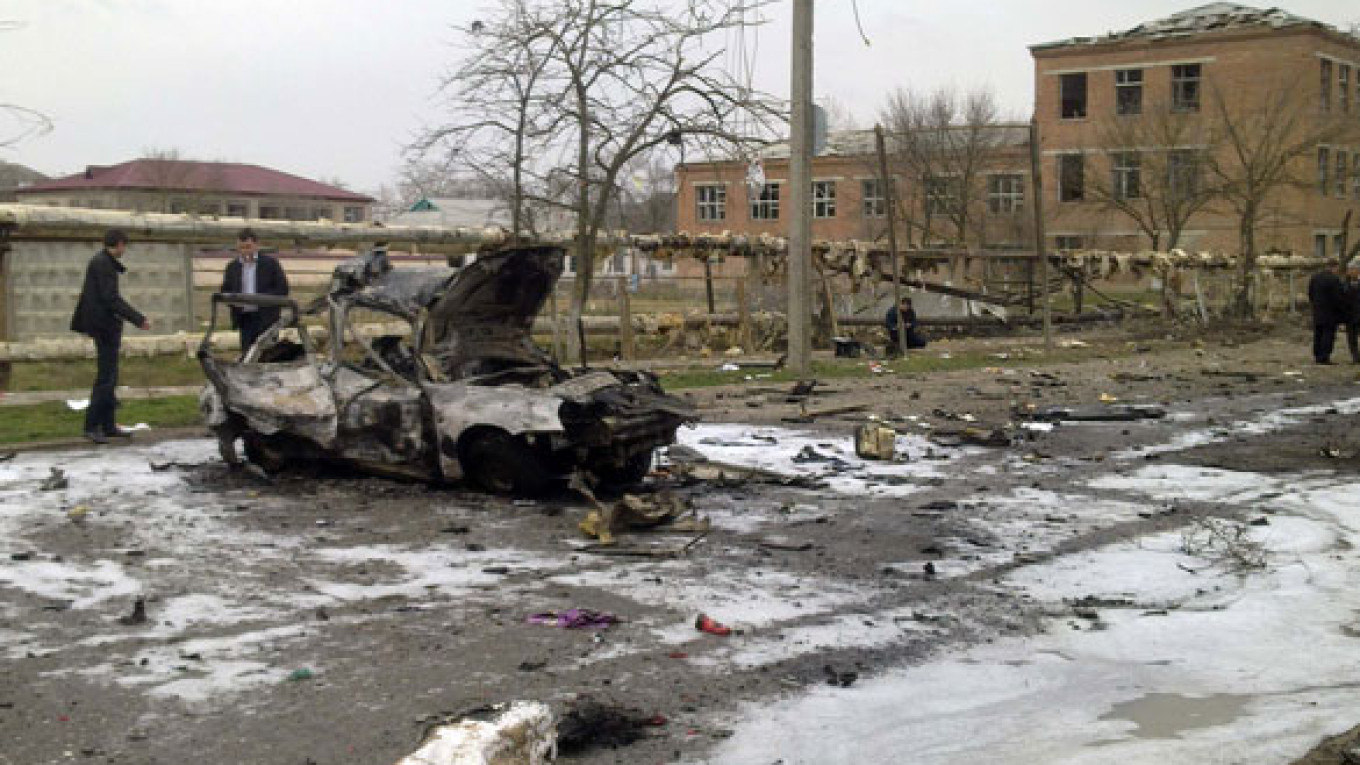MAKHACHKALA — Suspected suicide bombers killed at least 12 people in the North Caucasus on Wednesday, two days after deadly attacks in Moscow that authorities linked to insurgents from the region.
The coordinated attack in the town of Kizlyar in Dagestan, which borders Chechnya, was the latest outbreak in a surge of violence in the Caucasus that is challenging the Kremlin a decade after a war against Chechen separatists.
The bombings in Dagestan came 48 hours after Moscow was hit by its bloodiest attack in six years — twin morning rush-hour blasts that killed 39. Authorities blamed female suicide bombers with connections to the North Caucasus.
Prime Minister Vladimir Putin said a single group could have been behind the bombings in Moscow and Dagestan.
"Yet another terrorist act has been committed. I do not rule out that it is one and the same gang acting," Putin told a government meeting, calling the attacks "a crime against Russia."
He ordered Interior Minister Rashid Nurgaliyev to bolster the police presence in the North Caucasus.
A suicide bomber dressed in a police uniform set off the second of two blasts in Kizlyar, which killed the town's police chief and several other officers, regional police and prosecutorial officials told Reuters.
The bomber pushed his way into a crowd of police and onlookers drawn by a massive car-bomb blast, officials said — a common tactic of North Caucasus insurgents, who have been attacking law enforcement authorities almost daily.
Televised footage showed two gutted cars and a deep crater on a debris-strewn street lined by bare trees, and a red brick schoolhouse with its windows blown out and roof partly ripped off. Reports said there were no children in the school.
The car bomb exploded with the force of as much as 200 kilograms of TNT, Russian news agencies quoted prosecutorial investigators in Dagestan as saying.
A police official said a black, four-wheel drive Niva vehicle had exploded after traffic police tried to stop it, indicating that a suicide bomber had been behind the wheel.
The Investigative Committee, however, said the Niva had been parked when the blast occurred. The blasts killed 12 people, nine of them police officers, and 23 others were hospitalized, the Investigative Committee said.
A provincial police spokesman said Kizlyar police chief Vitaly Vedernikov was among the dead. In addition to police, an investigator from the prosecutor's office and a civilian were killed, Russian news agencies cited police as saying.
Dagestan, a predominantly Muslim province on the Caspian Sea with a patchwork of different ethnic groups, is plagued by violence stemming from the Islamic insurgency across the North Caucasus as well as criminal disputes and clan rivalries.
The Moscow metro attack fuelled fears of a broader offensive by rebels based in the North Caucasus. It underscored the Kremlin's failure to keep militants in check and contain violence to the region along Russia's southern fringe.
Putin, who led Moscow into a war against Chechen separatists in 1999 that sealed his rise to power, said on Tuesday those behind the bombings must be scraped "from the bottom of the sewers" and exposed.
President Dmitry Medvedev stressed the insurgency would not be stopped by force alone, saying the government must attack root causes such as poverty and corruption in the Caucasus.
On Wednesday, Medvedev called Dagestan's top official and promised help for injured victims and relatives of the dead, the Kremlin said.
A Message from The Moscow Times:
Dear readers,
We are facing unprecedented challenges. Russia's Prosecutor General's Office has designated The Moscow Times as an "undesirable" organization, criminalizing our work and putting our staff at risk of prosecution. This follows our earlier unjust labeling as a "foreign agent."
These actions are direct attempts to silence independent journalism in Russia. The authorities claim our work "discredits the decisions of the Russian leadership." We see things differently: we strive to provide accurate, unbiased reporting on Russia.
We, the journalists of The Moscow Times, refuse to be silenced. But to continue our work, we need your help.
Your support, no matter how small, makes a world of difference. If you can, please support us monthly starting from just $2. It's quick to set up, and every contribution makes a significant impact.
By supporting The Moscow Times, you're defending open, independent journalism in the face of repression. Thank you for standing with us.
Remind me later.


